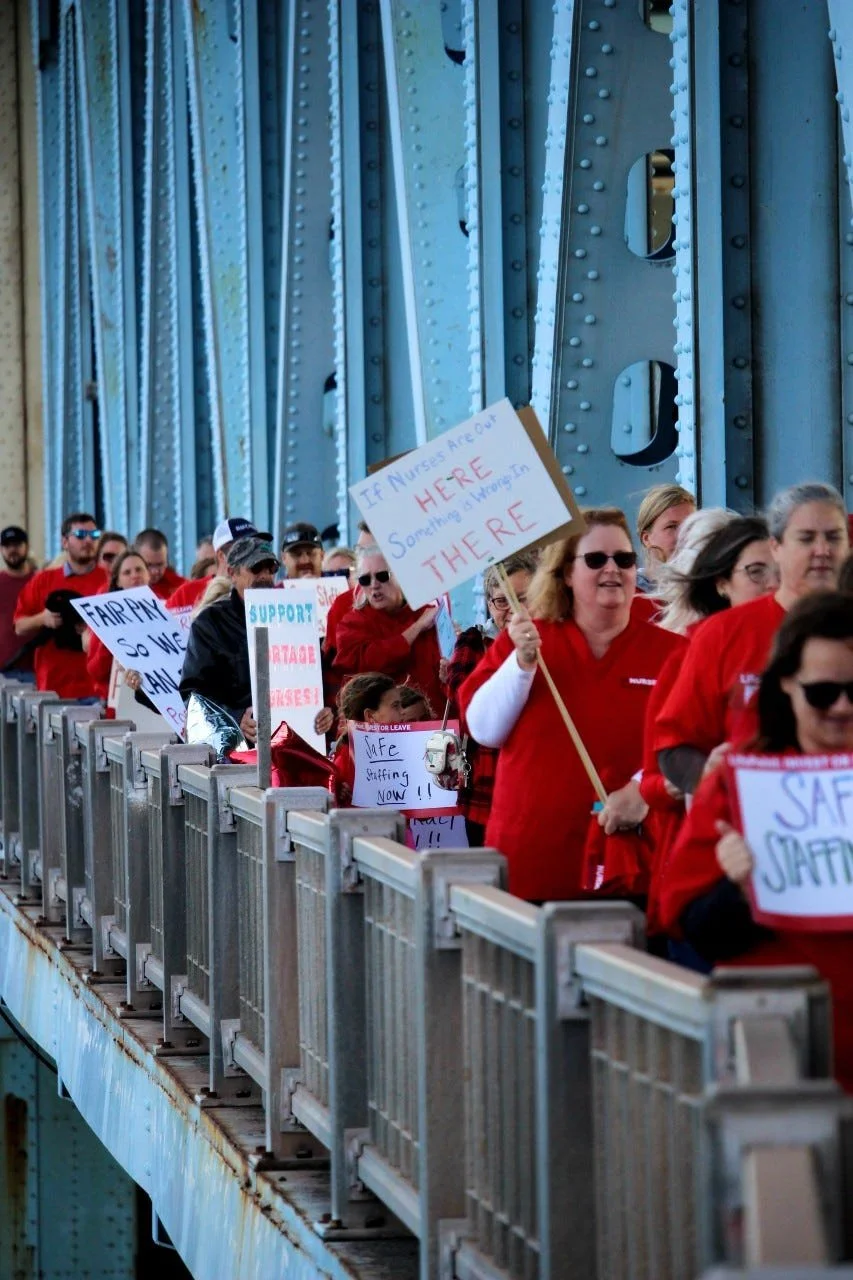Nurses draw a red line
Around 90 people walked the Portage Lake Lift Bridge with signs and chanting to support nurses in their contract negotiations with UPHS-Portage on Thursday afternoon.
Kendra Benson, right, preparing for the march.
Kendra Benson has been a nurse at UP Health System-Portage for four years. She’s also worked with Upper Great Lakes and for a year in Detroit. She participated in the rally and interviewed with several media outlets.
“What we want is a fair contract,” Benson said. “We’ve been in negotiations now for going on six months, and they’ve pushed back our contract three separate times.”
She said that the meetings aren’t accomplishing much more than scheduling more meetings, and so now the nurses are putting public pressure on the hospital system to bargain in better faith. Benson said they’re pushing for safe staffing levels and a better recruitment and retention plan.
“So, in order to recruit and retain we need a wage scale that is competitive with our local hospitals,” Benson said. “Which, up here, we’re the lowest-paid nurses in the area, that’s including Marquette.”
Benson said some of the nurses are being mandated to work 18-hour shifts, and that the hospital is hiring part-time staff to work long hours similar to a full-time nurse, but without benefits.
“We want to feel appreciated and we feel, you know, even after all this pandemic and whatnot, we don’t feel appreciated,” Benson said.
Danielle Hamlin, in the red and black plaid, walking to the lift bridge from Bridgeview Park.
Danielle Hamlin has been nursing at UPHS-Portage for 21 years and has been part of several contract negotiations in the past.
“Three years ago they cried poverty and we did not get a raise…” Hamlin said. “Now we’re just trying to be competitive with the hospitals all around.”
Hamlin said the wages at UPHS-Portage are lagging behind other local hospitals by as much as $1.70 an hour. For an employee working 40 hours per week, that calculates out to about $3,500 per year.
She said after the staff cuts during the COVID-19 pandemic, the hospital hasn’t been restaffed to meet the needs of fully reopening.
“We like two dayshift nurses, two nightshift nurses, and a swing shift and we’re way beyond—the ED (emergency department) is not at all at that,” Hamlin said. “We have eight nurses I believe, right now, and we’re supposed to be staffed with 15.”
She said that the lack of staff has kept those nurses remaining at the hospital busier than ever before. When other departments are full, which Hamlin said the intensive care unit currently is, patients have been shifted into the emergency department instead.
“It’s not the proper care,” Hamlin said.
She said the nurses have also requested that security be posted in the emergency room due to an increase in violent incidents with patients, but the hospital has yet to have anyone posted there.
“Some of the staff left because of not feeling safe,” Hamlin said.
Hamlin said the hospital wants to offer signing bonuses for new employees but hasn’t agreed to what they feel is necessary for staff retention.
“So right away, those people are making more than us,” she said.
Hamlin said she felt sad because she used to love her job, but it has become difficult to keep going in for long shifts, with few coworkers, and low pay.
The Michigan Nurses Association, which represents unionized nurses in Michigan, also supports the Safe Patient Care Act, of which Upper Peninsula Senator Ed McBroom is a cosponsor.
The bill sets patient-to-nurse ratios for different departments. An intensive or critical care unit would have to be staffed 1-to-1, all the way down to rehabilitation care, which can be staffed 1-to-5 under the bill. It also limits the amount of overtime a hospital can ask a nurse to work in its effort to meet those staffing goals.
There are currently no patient-to-nurse ratios mandated by law in Michigan.
Problems for hospital departments like understaffing, unsafe working conditions, and stagnant wages are a problem nationwide, with reports from USA Today, Yahoo Finance, Financial Times, Reuters, and numerous local outlets around the country running articles and editorials about it over the last month.
Some hospitals have even had to halt pediatric and trauma admissions or call in the National Guard to maintain staff.
UPHS-Portage is operated by LifePoint Health, a privately held company. Their most recent SEC filings available are from 2018. In the most recent annual filing, they claim $6.2 billion in revenue in 2017 and $102 million in net income (page 50). Macroaxis, an online investment analysis tool, projects their 2021 net income to be $143 million and revenue at $4.86 billion.
UPHS - Portage administration declined to be interviewed for this story, but did provide Copper Beacon with a written statement:
The employees represented by the Michigan Nurses Association (MNA) are critical members of our team, and we support them and respect their right to assemble and speak freely to the community they serve. We understand that the hospital’s contract negotiations with the MNA will likely be addressed. While we cannot comment on specific elements of those negotiations out of respect for the bargaining process, we are confident that the result will be a mutually agreeable contract for all. In the meantime, please rest assured that we will not be distracted from providing excellent care to our patients and community.
UP Health System – Portage takes very seriously our commitment to delivering high-quality, safe, and compassionate care close to home, and we strive daily to create excellent workplaces for our employees. Especially during this pandemic, which has arguably been the most challenging situation the healthcare industry has ever faced, we want to recognize and support our staff and clinical teams who have cared for our patients during this time.
Many cars honked in support of the protestors. Several people waved or shouted. One dog barked repeatedly out of the window of a passing SUV.









